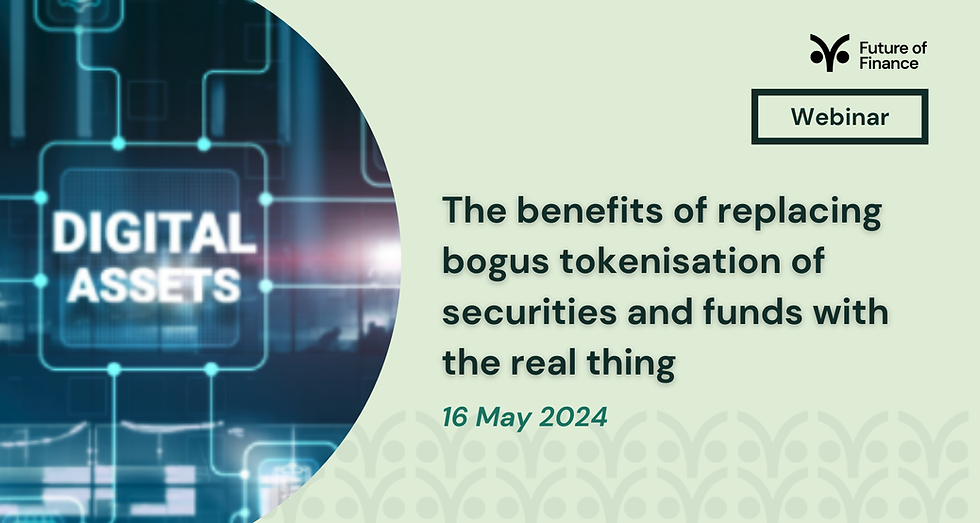What do stock exchanges need to survive the tokenisation of everything?
- May 2, 2024
- 5 min read
Updated: Jul 23, 2025

What is the webinar about?
The story of stock exchanges over the last 50 years is one of trading, data and technology. These three factors are shaping the next 50 years already, but in ways that are far from familiar. Back in 1971, when Nasdaq became the first electronic stock price quotation system, stock exchanges consisted almost entirely of national monopolies or oligopolies, with competitors at home or abroad almost unknown, physical trading the norm and prices a by-product of trading rather than a source of data for sale. The purpose of a stock exchange was clear: it was to bring together buyers and sellers to establish the price at which the demand for the future returns promised by a financial asset matched the available supply. In other words, exchanges competed chiefly on their ability to form prices efficiently. This concept survived the initial impact of digital technology. The early adopters of digital technology, such as Nasdaq, were not trading platforms but systems for publishing the prices formed by trading. Even after trading moved from trading floors to electronic trading systems, starting in the 1980s, digital technology did not disrupt the fundamental purpose of an exchange: being a trading venue. Data vending was largely the preserve of independents such as Thomson, Reuters and Bloomberg. It was not until Nasdaq bought data vendor Quandl in 2017 that the idea of the stock exchange as data vendor became plain. This mutation culminated in the purchase by the London Stock Exchange Group (LSEG) of Refinitiv – the combined data businesses of the historical Thomson and Reuters – in 2021, even at the cost of jettisoning its Italian equity and debt trading businesses. This shift by exchanges into data vending reflected a fundamental change in trading sparked by the coming into force in 2007 of Regulation National Market System (Reg NMS) in the United States and the first iteration of the Markets in Financial Instruments Directive (MiFID) in Europe. These measures spawned broker and investment bank-controlled competitors to the established national stock exchanges, known as Alternative Trading Systems (ATSs) in the United States and Multilateral Trading Facilities (MTFs) in Europe. ATSs and MTFs shrank the market share and trading revenues of traditional stock exchanges, which diversified into selling technology and data to compensate for the lost revenues. Exchanges are now investing in the migration of data to the Cloud – the flagship deal is the ten year contract LSEG has signed with Microsoft – where it can be devoured more conveniently by a growing range of artificial intelligence (AI) and machine learning (ML) tools that rely on data to improve not just risk management and market surveillance but trading and investment. This turns the original nexus between trading and price formation on its head; instead of trading as the sole driver of data, data now drives trading too. It is an apposite sign of the growing inseparability of data, technology and trading in the stock exchange industry over the last 50 years. Now exchanges face an opportunity which erases that distinction altogether: the tokenisation of securities. Tokens issued on to blockchains recognise no distinction between the data, the trading of the tokens and the technologies that store and transfer the tokens. Tokenisation promises to turn trading into flows of data in tokenised form across interoperating blockchain technologies. Some traditional exchanges are taking this transformation seriously. But most of the innovation is coming from elsewhere. Centralised cryptocurrency exchanges offer on-line trading around the clock, in-house custody services, access to digital forms of money such as Stablecoins and the option to trade conventional stocks in digital wrappings. Peer-to-peer Decentralised Exchanges (or DEXes) offer investors the opportunity to profit from staking or lending their holdings of cryptocurrencies at prices established algorithmically by automated market makers. And a growing breed of specialised security and fund token exchanges expect to capitalise on the steady migration of the traditional equity, debt and fund markets to a tokenised model, alongside an already-visible tokenisation of previously hard-to-access financial assets such as real estate, privately managed assets and commodities. In short, stock exchanges are now at that point in the industry lifecycle where many companies are offering new ways of raising capital and trading financial assets that are compelling enough to be certain of success. What follows is not hard to predict: a period of consolidation as the successful outperform the unsuccessful. This webinar will explore the ingredients of success.
Why attend?
Rival conceptions of the successful stock exchange of the future are contending for dominance in every major financial centre – and, importantly, many new entrants are based in aspirant financial centres, especially in the Middle East and the Caribbean. The innovators are being encouraged by governments, regulators, asset managers and end-investors. In terms of global market capitalisation, the established stock exchanges of North America and Europe are already shrinking. Getting tokenisation right could be the greatest strategic coup of all time, while getting it wrong could be existential. Service providers that back successful strategies will transform their own business, while those that back unsuccessful strategies will likely disappear. It pays to understand what might make the difference.
Who should attend?
Anybody operating or working in any part of a traditional stock exchange, including clearing and settlement, or at an ATS or MTF, a centralised cryptocurrency exchange, a decentralised exchange (DEX), a securities or funds or real or privately managed assets token exchange or a tokenisation engine, vendors of stock exchange and tokenisation technologies, and users of stock exchange services such as corporate issuers, asset managers, brokers and investment and custodian bankers.
When is it happening?
At 14.00 London time on Wednesday 26 June 2024
What topics will be discussed?
What is the nature of the strategic threats that confront established exchanges?
How can the various types of exchange best be categorised and understood as service providers and competitors?
What do regulators want from exchanges?
What does the buy-side want from exchanges?
What do issuers want from exchanges?
What are traditional stock exchanges doing about tokenisation now?
Which trading products and services must exchanges provide to improve their chances of survival?
Which non-trading products and services must exchanges provide to improve their chances of survival?
What are the most reliable sources of revenue for exchanges in the future?
What type of exchange is best-adapted to survive a period of potentially revolutionary change?
Who is on the panel?
For more information please contact Wendy Gallagher on wendy.gallagher@futureoffinance.biz
Webinar Recording


